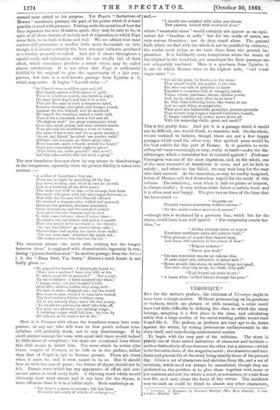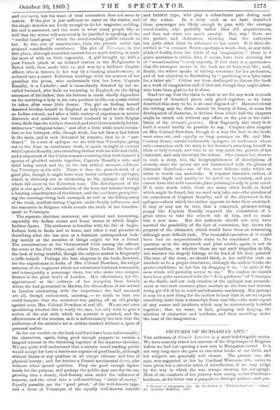VERONIQUE.*
Bur for the writer's preface, the criticism of Veronique ought to have been a simple matter. Without pronouncing on its goodness or badness, which are phrases of wide meaning, a critic could have had little difficulty in defining the class to which the story belongs, assigning it a first place in the class, and calculating safely that a large section of the novel-reading public would read it and like it. The preface, as prefaces are very apt to do, turns against the writer, by raising pretensions undiscoverable in the story itself, and introducing controversial matter.
To begin with the easy part of the criticism. The story is plainly one of those mixed narratives of character and incident— neither distinctively of one class nor the other, but a mixture—which is the favourite form of the magazine novel ; the character and inci- dents and general life of the story being usually those of the present day. Given a set of characters and sketches from life, and a set of incidents, which need not always be sensational, though they are preferred so, the problem is to glue these together with more or less neatness and call the whole a novel, or a romance, or a tale from real life, as it may please the fancy of the writer. The incidents may be such as could be fitted to almost any other characters,
reronique. A Romance by Florence Marryat (Mrs. Ross Church). 8 vols. London: Bentley. 1565. and vice versa, but the want of vital connection does not seem to matter. If the plot is just sufficient to carry on the reader, and the single sketches are lively enough to do for magazine padding, the end is answered, and the work is what many people like so well that the writer will conceivably be justified in speaking of the "cordial hand-grasp" which the novel-reading public extends to her. In this sort of manufacture, then, the present writer has attained considerable excellence. The plot of Veronique, in the first place, although somewhat narrow for so much writing, is made the most of with no little ingenuity. A girl brought up with a poor French priest at an isolated station in the Neilgherries is flirted with, then made love to, and won by a brilliant English officer, who is thrown in her way by a hunting misadventure ; is seduced into a secret Yelverton marriage with the consent of her guardian the priest, who understands that her lover, Captain Romilly, is a Catholic ; and is immediately deserted by her so- called husband, who finds on returning to England, on the dying summons of his father, that his fortune is made wholly dependent on his marrying a lady in his own position in life,—a course which he takes, after some little demur. The girl on finding herself deserted betakes herself to England as lady's-maid to the wife of an Indian colonel, and after a little variety of experience in service discovers and confronts her truant husband in a little Belgian town, finds that she really is deserted, and that there is no help for her, retires to a " religious house," and after a little while sends intima- tion to her betrayer, who, though weak, has not been a bad fellow in the main, and is now devoured by remorse, that he is " par- doned." In a sort of epilogue we are told that Veronique, going out to the East on missionary work, is again brought in contact with Captain Romilly, also travelling thither with his wife and child; and a shipwreck of the China steamer occurring they both commit a species of glorified suicide together, Captain Romilly's wife and child being saved, and he, in the last critical moment, address- ing Veronique as his wife. There is thus the ground-work of a good plot, though it might have been better without the epilogue, which is obviously not so interesting as the epilogue of reality which did occur in the Yelverton case. The development of the plot is also good, the introduction of the hero and heroine through a hunting misadventure of the former, and the accidents precipitat- ing the marriage being well managed, as well as the falling-away of the weak, comfort-loving Captain under family influences, and the rencontre in Belgium which reveals the truth of her abandon- ment to Veronique.
The separate sketches, moreover, are spirited and interesting, especially the Indian scenes and home scenes in which Anglo- Indians figure. The authoress is familiar with the life of Anglo- Indians both in India and at home, and takes a real pleasure in describing what she has seen as a feminine correspondent look- ing mainly at the outsides of things might do for a friend. The conversations at the Ootacamund Club among the officers, the scene at the Post Office, and others from Indian Life have all the look of being truthful, though the subject-matter is frequently a trifle insipid. Perhaps the best chapters in the book, however, are the experiences in India of Mrs. Colonel Dowdson, the vulgar autocrat of the regiment which her submissive husband commands, and consequently a personage there, but who sinks into insigni- ficance in the great world of Loudon. Her affectations, her dis- appointment at the coldness of her reception from friends whom she had patronized in Madras, the discomforts of her arrival in London contrasting with the importance she had assumed are all, though caricatured, amusing, — so much so that one could imagine that the authoress was paying off an old grudge against some Mrs. Colonel Dowdson of real life. We are not even speculating whether this is really the case, but only wish to give a notion of the zest with which the portrait is painted, and the effectiveness of the touches, as it is unfortunately too true that the perfection of the satirist's art is seldom reached without a spice of personal malice.
So far our verdict on the book could not have been unfavourable ; the characters, again, being good enough puppets to sustain a languid interest in the threading together of the separate sketches. We can quite well understand that a certain novel-reading public would accept for hero a handsome captain of good family, although without brains or any qualities at all except idleness and love of physical luxury ; and for heroine a French sentimental devote, also without other special qualities. They are good enough figure- heads for the purpose, and perhaps the public may care for the one growing into a steady, God-fearing man under the influence of remorse, and the other into a self-sacrificing " sister of mercy." Equally passable are the " good priest," of the well-known type, and a lover of Veronique of the equally well-known humble and faithful type, who play a subordinate part during most of the action. In a story such as we have described these personages are likely enough to pass with the average novel-reader, who probably rather likes old acquaintances, and does not want too much novelty. But, alas ! there are the preface and dedication, showing that the authoress has quite other ideas in reference to her novel. It is there de- scribed as " a common flower—perhaps a weed—but, at any sate, plucked freshly from the fields of my imagination ;" there is a grave assurance to critics, who, it seems, have been accusing her of " sensationalism "—very unjustly, if this story is a specimen— that the strongest scenes in the book are all from real life ; and, finally, the writer speaks of having reverence for her profession, and of her objection to flourishing by " pandering to a false taste for a falser art." Critics are thus challenged to discuss the book as a work of imagination and of true art, though they might other- wise have been glad to let it alone.
Need we say that the claim to rank in art for any work so much composed of detached pieces only glued together, as we have described this story to be, is at once disposed of ? However clever the writing may be, there cannot be beauty of form, or room for development of character, in fictions from which half the chapters might be struck out without any effect on the plot or the exhi- bition of the dramatis persona. How flagrantly this story is at fault it would hardly be possible to say. Chapter after chapter on Mrs. Colonel Dowdson, though in a way the best in the book, must come out, and equally so long passages on Mr. and Mrs. Conway Jones, certain fashionable spongers on tradesmen whose only connection with the story is the heroine's attaching herself to them as lady's-maid, and who in no way assist the growth of her character, and only interrupt the action. One cannot but observe in such a story, too, the inappropriateness of descriptions of scenery, since the scenes are not harmonized with the phases of character described,—one of the most delicate tasks which an artist in words can undertake. It requires character, indeed, of a certain depth and quality to be acted on by scenery, and you cannot have this with common-place personages only in your novel. If it were worth while, there are many other faults in detail which might be found, but we need only take one—the question of the conversion of Captain Romilly, and of the shipwreck in the epilogue—about which the author appears to have been exercised. It may or may not be true, that a conceited, pleasure-loving puppy like Captain Romilly required the commission of a great crime to take the conceit out of him, and so make him a new man. But the authoress should not only have asserted the possibility of the fact of conversion, but shown the progress of the character, which would have been an interesting although most difficult task. The successful execution of it would have had an unquestionable claim to be considered art. The question as to the shipwreck and joint suicide, again, is not its sensationalism, or whether there are not such tragedies in life, but whether the tragedy belongs to the kind of life here painted. The tone of the story, we should think, is too mild for such an incident to be a proper conclusion, although the author thinks she proves confidence iu her line by dragging it in, " in spite of the onus which will probably accrue to me." We confess we should have been quite contented with the " Je te pardonne " of Wronique as the finish, and our only emotion at the epilogue was astonish- ment at two such common-place mortals as the hero and heroine being got rid of by so much melodramatic machinery. But perhaps it may be a new thing for the author to hear that in art we expect something more than a transcript from real life,—the mere report of any scenes and incidents which may be conveniently huddled together ; that we want, in fact, grouping and keeping, the selection of characters and incidents, and their moulding under the heat of the imagination.































 Previous page
Previous page